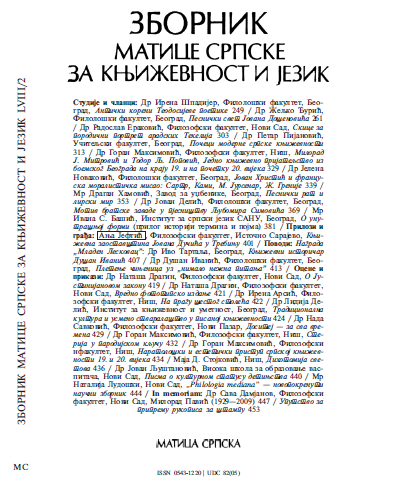ЛНТИЧКИ КОРЕНИ ТЕОДОСИЈЕВЕ ПОЕТИКЕ
THEODOSIOS' POETICS AND ITS ROOTS IN THE ANTIQUITY
Author(s): Irena ŠpadijerSubject(s): Ancient World, Greek Literature, Theory of Literature
Published by: Матица српска
Keywords: Theodosios; Poetics; Antiquity;
Summary/Abstract: Theodosios of Hilandar is one of the few medieval writers whose work includes explicit poetic views. These views are in line with Horatio’s well-known statement on the function of literature (prodesse et delectare, utile et dulce); however, the way in which these views reached and were incorporated in the Serbian medieval literature is very specific. Theodosios’ view is that the lives of exceptional people are written and read for the benefit of the readers/listeners — “these works are beneficial to the listeners per se, and that benefit is the writers’ reward”. In addition, the moral instruction obtained from the reading of hagiographic works can be very pleasant. By stressing the motives of “benefit” and “pleasant instruction” in his prose works, Theodosios joins the advocates of the approach to literature and its function which had an undisputable legitimacy since the antiquity and throughout the Middle Ages, even in the centuries that followed. The roots of that approach can be found in the classical Greek (Aristotelian) poetics which was adopted and further developed by Hellenistic writers, particularly by Neoptolemus (3rd century BC) and which, through late antiquity (The Academy of Athens in particular) and early Byzantine period and, later, Aton literature — reached Theodosios.
Journal: Зборник Матице српске за књижевност и језик
- Issue Year: 58/2010
- Issue No: 2
- Page Range: 249-260
- Page Count: 12
- Language: Serbian

